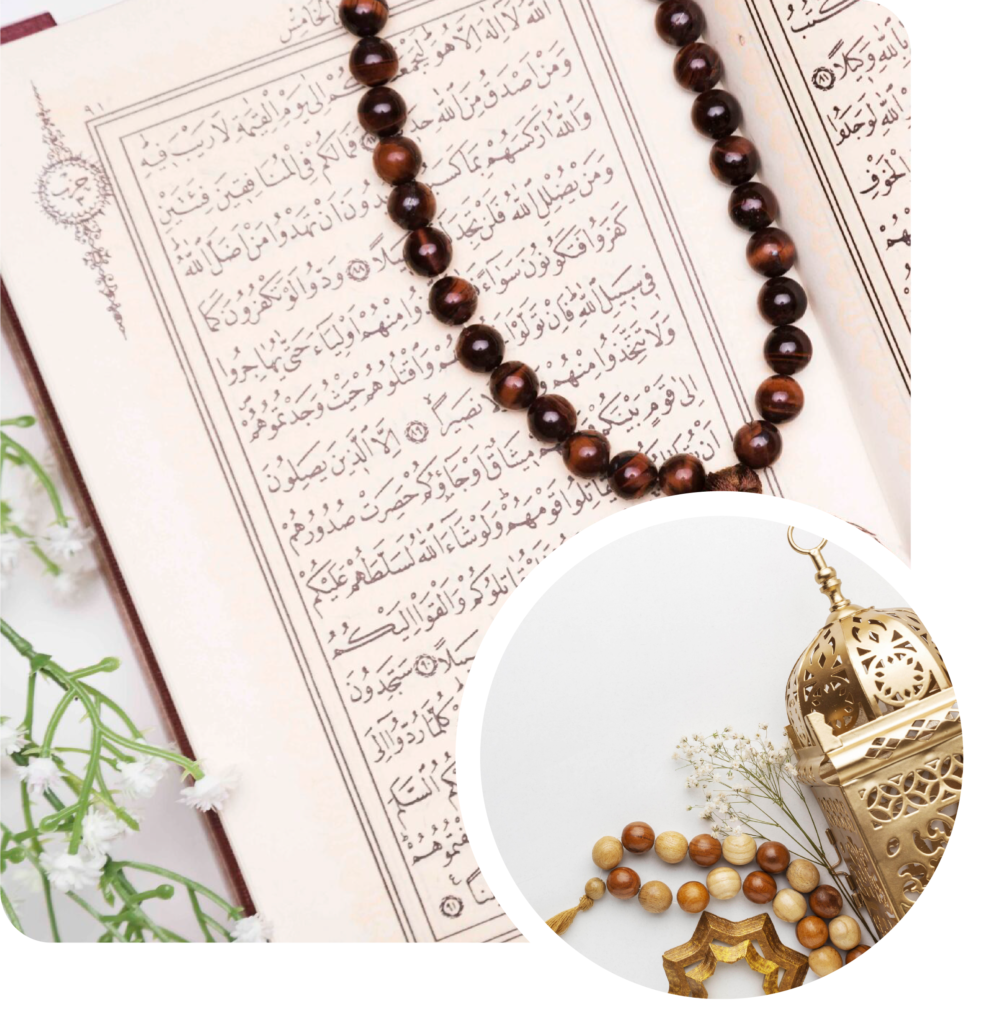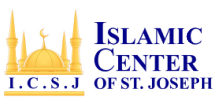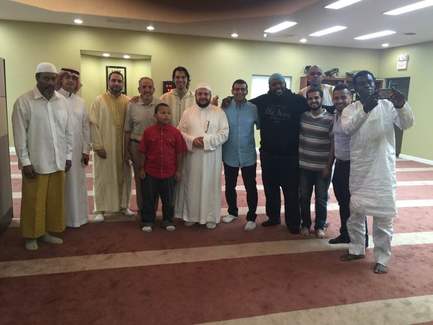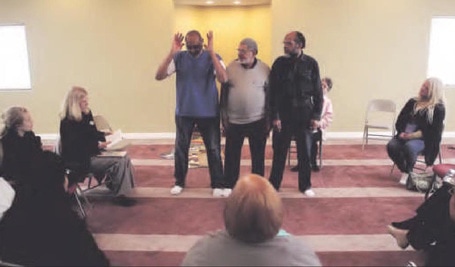
Here are some of the most frequently-asked questions (FAQs) from visitors to our masjid location and our website.
Where are you located?
We are located at 2325 Messanie St. in St. Joseph.
What time are Friday prayers held?
The Khutbah (Islamic sermon) begins at 1 p.m. We start the weekly congregational prayers at 1:30 p.m.
What is Islam?
Here is an abridged description of Islam and 100 frequently-asked questions.
What is ICSJ’s goal?
Ever since a spike in Muslim migration to the area in the early 2000s, Muslims in St. Joseph have been underserved. ICSJ’s mission is to fill that gap by establishing a Muslim family life center to meet the spiritual, social, and civic needs of all area Muslims.
I want to learn more about Islam and visit the Islamic Center of St. Joseph?
Please see this page for more information about scheduling a visit to the Islamic Center of St. Joseph and about mosque etiquette.
Why do you take your shoes off?
A mosque is free of statues and utilizes rugs instead of pews. It is appropriate to remove one’s shoes before entering the prayer area in a mosque, so that the floors and carpets aren’t covered with dirt—after all, that is where people pray.
Can I take photos?
Yes. Picture taking is permitted inside the mosque, including in both prayer areas. Please be considerate of others’ privacy if they do not wish to be photographed.
Where are the women praying?
Women offer daily prayers in a room catty-cornered to the main prayer hall. The separation provides women with privacy and modesty. The physical separation helps men and women maintain focus on prayer rather than on one another.
Why do you have foot-sinks in the bathroom?
A Muslim must be in a state of physical purity before making their prayer. That includes washing the feet. Our restrooms are equipped with bidets and other modern amenities for wudu, the self-purification process performed before prayers.
What happens when people join the prayer late?
They will join the prayer already in progress, and after the Imam (leader of the prayer) has finished, they will complete what they missed.
How do Friday prayers work?
Friday is the day of congregational prayers for Muslims, so a short sermon followed by a brief prayer at the mosque in congregation is substituted for the regular noon-time prayer. The service begins with the call to prayer, followed by a lecture (rather, two short lectures with a brief pause in the middle). After the lecture (called a Khutbah), another call to prayer is made, and the congregation stands to follow the Imam in the prayer. In St. Joseph, year-round, the Friday prayer begins with the Khutba at 1 p.m. and concludes with the prayer at 1:30 p.m.
Are mosques new to America?
Mosques have been here since the colonial era. One of the first mosques in North American history was on Kent Island, Md. Between 1731 and 1733, African American Muslim slave and Islamic scholar Job Ben Solomon, a cattle driver, would regularly steal away to the woods there for his prayers, despite a boy who threw dirt on him as he made his prostrations. Today, there are more than 2,000 places of Muslim prayer in the United States, most of them mosques.
What’s the difference between a mosque and masjid?
They are the same. Masjid is the Arabic word for mosque.
What is jihad?
One misconception about Islam is often the word jihad. Crusaders from the Middle Ages interpreted jihad as a holy war; however, in Islam, jihad means a struggle against evil, which can include everyday temptations.
Do Islam and Christianity have different origins?
No. Together with Judaism, they trace back to the prophet and patriarch Abraham, and their three prophets are directly descended from his sons: Muhammad from the eldest, Ishmael, and Moses and Jesus from Isaac. Abraham established the settlement that today is the city of Makkah (Mecca), and built the Kaaba, which Muslims turn toward daily when they pray.
I am concerned (even afraid) about what’s actually going on in the mosque. Are you teaching people to be violent?
Mosques are probably America’s best line of defense against terrorism. They actually combat radicalism by providing a community to guide Muslims who have fallen to the rhetoric of radicalism. Mosques, however, remain greatly misunderstood in the American landscape.
Visit us, and listen to what our spiritual leader says. What you’ll hear is talk about prayer, fasting, charity, kindness to parents, and service to the community.
What are the masjid's demographics?
ICSJ is composed of a diverse group of professionals, lifelong St. Joseph residents, students, and business owners. The Muslim community in St. Joseph is small (numbering about 100 individuals), but you will find us deeply entrenched in all sectors of the community. In St. Joe, we are the town’s police officers, educators, doctors, scientists, business owners, meat plant workers, and community organizers.
Many ethnicities attend ICSJ, including those from Pakistan, Germany, Jordan, Morocco, Sudan, and Egypt. The languages (besides English, of course) spoken are mainly Urdu and Arabic.
The age groups range from infants to elders, with the majority of community members aged 40 to 60.
How big is the mosque? Are there plans to expand?
The mosque is 3,000 square feet. It was built in 2010 on the old Sears parking lot, just outside the heart of St. Joseph’s historic Midtown.
Planned additions include a community activities center, a larger and paved parking lot, and a cemetery. With the continued eastward development in St. Joseph, any additional mosque in St. Joseph will likely be built on the city’s eastern edge.
Who runs the mosque?
ICSJ has a part-time Imam (spiritual leader) who is its only paid employee. Its governance is based on a two-tiered administrative structure consisting of a Board of Directors and an Executive Committee. The Board performs primary oversight and strategic functions, while the Executive Committee is responsible for the day-to-day management of the Masjid. The Board and Executive Committee are composed of both men and women volunteers. They are selected from amongst Masjid attendees who demonstrate a clear commitment to ICSJ’s mission of peace and prayer.
ICSJ has a nonprofit tax status, bylaws, and a constitution. Its bylaws provide for active involvement and consultation with religious authorities, both locally and nationally, to ensure that the mosque adheres to Islamic principles derived from the Qur’an (Islam’s holy book) and the Sunnah (the sayings and living habits of Muhammad, the main prophet of Islam).
Where did you get the funds to build the mosque? How much did it cost?
The St. Joseph mosque project included purchasing land in 2008 and constructing the 3,000-square-foot facility in 2010. The total cost was nearly $220,000. The costs were primarily held down through utilizing volunteer help in the community. About 40 percent of our construction dollars came from our local St. Joseph congregation. The remaining amount came from Muslim and non-Muslim donors across the U.S. Except for a single donation from a donor in the U.K., no foreign funds were used to construct this mosque.
Do mosques promote homegrown terrorism?
To the contrary, mosques are typical American religious institutions. In addition to worship services, most U.S. mosques hold weekend classes for children, offer charity to the poor, provide counseling services, and conduct interfaith programs. There have been unfortunate exceptions, and that has led to a renewed commitment among mosque leaders to confront extremism. We hope you will visit us and find that we are a premier site of American assimilation and community involvement.
How long have Muslims lived in St. Joseph?
As best as can be known, Muslims have lived in St. Joseph since the mid-1970s. A sustained migration of Muslims to the city began in the late 1990s. That growth has remained consistent.
As best as can be known, Muslims have lived in St. Joseph since the mid-1970s. A sustained migration of Muslims to the city began in the late 1990s. That growth has remained consistent.
Before the recent population upsurge, one of the first American-Muslim writers in the U.S. had lived in St. Joseph. In the late 19th century, Alexander Russell Webb, one of the earliest American converts to Islam, worked as an editor at the St. Joseph Daily Gazette. He later toured Victorian America, reached public renown, and became Islam’s first ambassador to America. It is the virtues that he championed – universal humanity, piety, and a sense of civic and political responsibility – that exemplify ICSJ’s mission of peace and prayer.
Where is St. Joseph?
St. Joseph is a tightly knit city just north of Kansas City. Settled on the banks of the Missouri River just a bow shot across from Kansas, it got rich after the Civil War when it was the jumping-off point for settlers headed out through Indian country along the Oregon Trail. The U.S. Census Bureau estimated its population in 2006 at 72,651.
I want to accept Islam. Whom should I contact?
The Outreach (Da’wah) Committee will be able to assist you. Please contact them via email at [email protected]. We check email daily.


